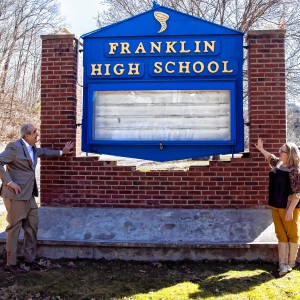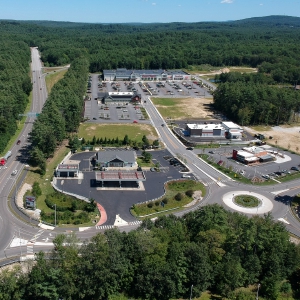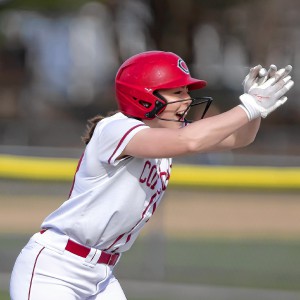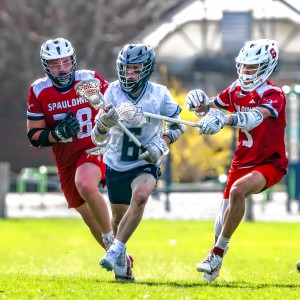Finally some snow: Warm temperatures have created challenges for high school ski teams
| Published: 01-21-2023 5:01 PM |
Concord Nordic ski head coach Erin Waters has never experienced a winter quite like this.
She skied at Concord High and in college and was the team’s assistant coach for two years before taking the head coaching position before last season. This is the first time one of her teams has ever gone this far into the season without being able to ski in Concord because there hasn’t been enough snow.
“Most winters have challenging moments, like a week or two where there’s no snow or it’s really warm or really icy,” Waters said. “This year has been unique, in that, in Concord we have not been able to ski yet.”
Even with the area receiving its largest snowfall of the season on Friday, high school ski teams typically don’t have to wait until late-January to use the ski trails in the area.
So far, the Concord Nordic team has only been able to participate in one event – last week in Dublin – and has had two races postponed because of the lack of snow.
The Tide have another race next week that they’re hoping to move to a location where they know there will be enough snow to avoid any further postponements.
In the meantime, the team has been relegated to alternative training methods in practice. This includes running, strength training, roller skiing and SkiErgs. They’ve also had the opportunity to put in time on skis at Proctor Academy in Andover and at Pats Peak in Henniker. Heading to those destinations requires more traveling, which has been limited due to a bus driver shortage in the area.
Despite these challenges, Waters has been pleased with how the team of 26 skiers has navigated the season. She noted a winter break trip they took to Craftsbury, Vermont, as key for setting the tone for their focus.
Article continues after...
Yesterday's Most Read Articles
 Regal Theater in Concord is closing Thursday
Regal Theater in Concord is closing Thursday
 With less than three months left, Concord Casino hasn’t found a buyer
With less than three months left, Concord Casino hasn’t found a buyer
 Phenix Hall, Christ the King food pantry, rail trail on Concord planning board’s agenda
Phenix Hall, Christ the King food pantry, rail trail on Concord planning board’s agenda
 Former Franklin High assistant principal Bill Athanas is making a gift to his former school
Former Franklin High assistant principal Bill Athanas is making a gift to his former school
 Another Chipotle coming to Concord
Another Chipotle coming to Concord
 Generally speaking, Don Bolduc, now a Pittsfield police officer, has tested himself for years
Generally speaking, Don Bolduc, now a Pittsfield police officer, has tested himself for years
“They had a ton of snow; it was wonderful skiing,” she said of Craftsbury. “Being able to hold onto that camaraderie, that energy, has made a huge difference so far.”
She also mentioned that every other school across the state is dealing with the same snowless obstacles. Very few teams have been able to compete, yet they’re all reaching a point in the schedule that features some of the more important races of the season.
While they’ve done their best to replicate skiing conditions without the snow, having that racing experience is hard to replace.
“Learning how to race is part of it,” Waters said. “You have to practice racing. You have to practice getting the jitters out. As coaches, we’re trying to do the best that we can to walk kids through how to mentally and physically prepare themselves for a race, but it’s not quite the same.”
It’s possible that next winter brings with it the frequent snow the area is accustomed to seeing, but moving forward, it’s likely that this won’t be the last time high schools around the state encounter a severe lack of snow as a direct result of climate change, something Waters frequently discusses with her coaching staff.
“We know that it’s only going to get worse,” she said. “Maybe next year will be better than this year, but looking at the long-term view, we’re probably going to have more winters like this; we’re going to have different challenges than we’ve ever seen before.”
All hope is not lost, however. There are steps that can be taken to maintain Nordic skiing as a high school athletic opportunity. Waters looks to Massachusetts as an example.
Further south, Massachusetts deals with the lack of snow more than New Hampshire does, but they have local golf courses, like Weston Ski Area, that make snow and allow for more regular opportunities for cross country skiers to train and get valuable experience.
“That requires a lot of resources, it requires snowmaking, but I do think that’s a model that works,” Waters said. “The sport is something that is worth protecting and investing in. I don’t think it’s worth just brushing it to the wayside because the weather is worse.”


 Wednesday’s high schools: Fancher’s 2-run blast leads Concord baseball to victory; plus more baseball, softball, lax and tennis results
Wednesday’s high schools: Fancher’s 2-run blast leads Concord baseball to victory; plus more baseball, softball, lax and tennis results Softball: Maddy Wachter Ks 12, Concord holds off Winnacunnet in 2023 championship rematch
Softball: Maddy Wachter Ks 12, Concord holds off Winnacunnet in 2023 championship rematch High schools: Tuesday’s track, baseball, softball, lacrosse and tennis results
High schools: Tuesday’s track, baseball, softball, lacrosse and tennis results Boys’ lacrosse: With a different level of energy and focus, MV feels primed for success
Boys’ lacrosse: With a different level of energy and focus, MV feels primed for success
